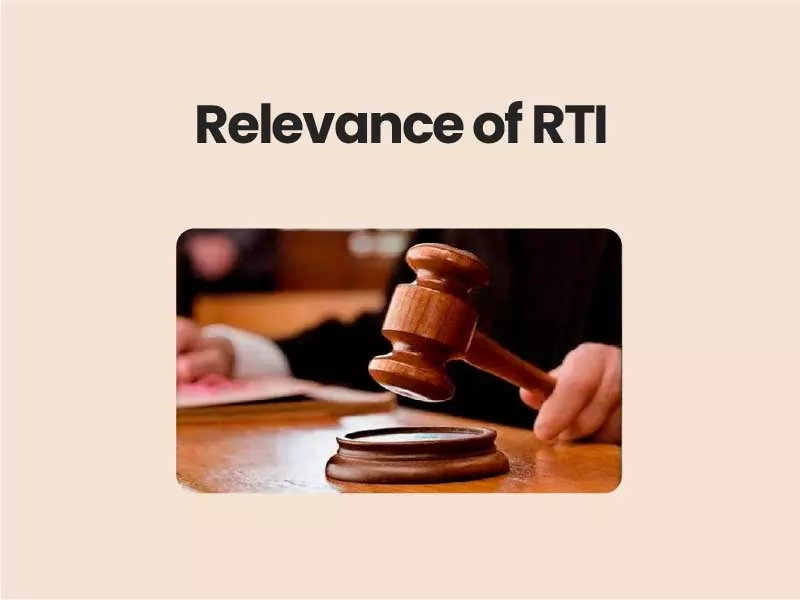Companion@360 → 7 Month programme to sharpen your writing skills → REGISTER NOW

Relevance of RTI, based on the recent judgment of SC
Recent News
Supreme Court has upheld the 2010 Delhi High Court Verdict and ruled that the office of Chief Justice of India is a public authority under the right to information Act. The five-judge bench led by Chief Justice of India highlighted the importance of transparency in the judiciary and said right to privacy and confidentiality is an important aspect. Apex court also held that judicial independence has to be kept in mind while dealing with transparency.
RTI Act 2005
Under the RTI Act, 2005, every public authority has to provide information to persons requesting for the information under the Act.
Public Authority includes the body constituted by or under the Constitution.
Information includes any material in any form, including records, documents, memos, e-mails, etc.
Significance
- Correspondence between the government and the judiciary on important issues such as the appointment of judges by the collegium, or, say, between political authority and a judge with respect to a certain case may now find its way into the public domain.
- The SC ruling paves the way for political parties to be brought under the RTI Act.
- Since registered political parties have affirmed their allegiance to the Constitution, Article 19 1 (a) of the Constitution, which upholds the right to information, must apply to them. The apex court will now have the moral heft to extend the RTI to political parties, whose finances are a subject of considerable mystery.
- Section 8 (1) (j) of the RTI Act:
The Delhi High Court has observed that information on the expenditure of government money in an official capacity cannot be regarded as personal information.
This is well defined under Section 8 (1) (j) of the RTI Act, which says:
“there shall be no obligation to give any citizen information which relates to personal information the disclosure of which has no relationship to any public activity or interest, or which would cause unwarranted invasion of the privacy of the individual unless the Central Public Information Officer or the State Public Information Officer or the appellate authority, as the case may be, is satisfied that the larger public interest justifies the disclosure of such information.”
There is much that the public can legitimately ask of the workings of the judiciary, such as verdicts delayed after the arguments have been heard.
- The belief that disclosure of information on the functioning of the judiciary will undermine its independence lacks basis.
- Justice is fundamentally based on the equality of all citizens before the law, and that includes lawmakers and its guardians.
- Justice is based on the rule of reason over fear and mystery. A judiciary that has little to conceal will be confident about interpreting the law without fear or favour.
- I can’t be used as a tool of surveillance:
There is certain information which is inherently private and presumptively protected under the privacy right. This inherently private information includes age gender sex, sexual preferences etc.
Referring to the RTI provisions, they also deal with exemptions and information that cannot be given to applicants, but the public interest should always “outweigh” personal interests if the person concerned is holding or about to hold a public office.
Dealing with “judicial independence”, the National Judicial Accountability Commission Act was struck down for protecting the judiciary against interference from the executive, but this did not mean that judiciary is free from “public scrutiny”.
This is not independence from accountability.
Read Also Anti Defection Law in India
Independence of judiciary means it has to be independent of the executive and not independent from the common public. People are entitled to know as to what public authorities are doing.
- Judiciary should be independent from the executive, not common public:
Separating the issue of accountability from independence, “Independence of the judiciary means it has to be independent from the executive and not independent from common public. People are entitled to know as to what public authorities are doing.”
In this light, CJI demanded that the discussions the collegium should be made public and the information could either be shared under the RTI Act or on a case-to-case basis.
The Judiciary needs to be protected from attempts to breach its independence. Such interference requires calibration of an appropriate amount of transparency in consonance with judicial independence.
- Fear of negative publicity preventing people from becoming judges:
During the hearing in the case in the Supreme Court, the constitution bench observed that due to fear of negative publicity many were now opting out of the race to become judges.
It had observed that the professional and family life of people could also be impacted by such publicity.
Therefore, CJI had orally observed on the last day of hearing that, “Nobody wants a system of opaqueness, but in the name of transparency we cannot destroy the institution of judiciary.”
Both rights to information and privacy were constitutional rights and not absolute.
Principle of proportionality is to be applied and the information disclosed should be proportional to the public interest at stake.
Conclusion
Striking a balance between Right to Information and Right to Privacy is essential. Both the rights were not in conflict with each other but were two faces of the same coin.
The Supreme Court said that confidentiality and right to privacy have to be maintained and added that RTI can’t be used for as a tool of surveillance.
It also said only names of judges recommended by the collegium can be disclosed, not the reasons.
Failure to bring about accountability reforms would erode trust in the courts’ impartiality, harming core judicial functions.
Transparency and the right to information are crucially linked to the rule of law itself.
Read Also Justice Verma Committee (JVC) recommendation
